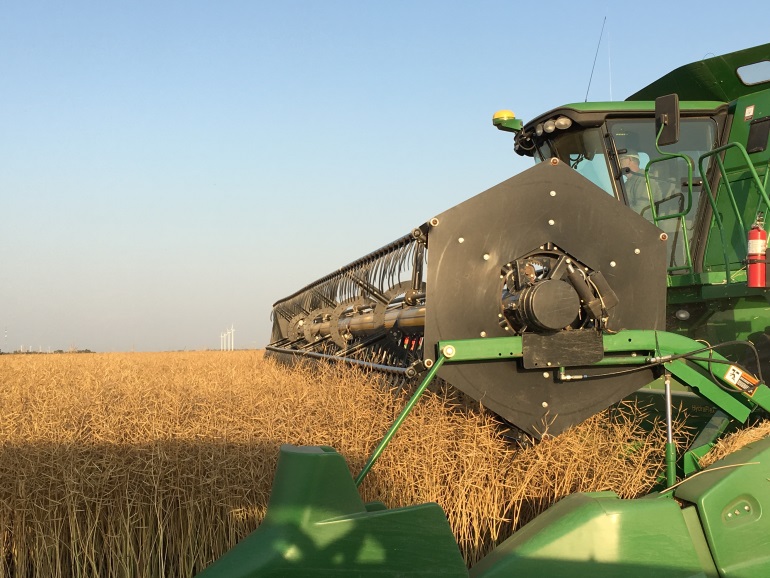As combines prepare to roll across fields near Portage la Prairie, local farmers face a harvest season marked by drought recovery and the harsh new reality of a 75.8% tariff on Canadian canola exports to China.
The timing of Beijing's punitive duty, announced just weeks before harvest, compounds anxieties stemming from an arid growing season.
Seasonal challenges and cautious hope
The region endured a significant lack of rainfall through much of the spring and summer. Curtis Sims of Emiline Farms near MacGregor describes the toll.
"The crops took some damage from lack of water; it was one of the worst droughts I've ever seen," Sims states. "Having said that, we had enough moisture reserves to kind of keep it together, mostly lower saline areas, some of them burned out, and [for those] the damage is irreplaceable."
![]()
Recent rains offered some reprieve, however, as he notes, "We had some rain finally, the last week or so, to save things from really falling apart. So we're kind of stabilized a little bit, but it looks like maybe a middling crop if we're optimistic."
Carl Stewart of Stewart Brothers' Farms near Poplar Point also noted the dry start but fared better than many.
"The season's been pretty good so far. To date, it was a touch on the dry side, but we fared quite a bit better than lots of folks in the province," Stewart says, adding that recent moisture boosted prospects, "I think the seed size on the canola is going to improve. We got a little bit a couple of weeks ago that should help with that. And then with the beans, it's definitely going to help."
![]()
He remains cautiously hopeful: "We're expecting a pretty good crop overall. You know, we're hoping to be pleasantly surprised."
Tariff fallout hits at a critical time
The Chinese tariff announcement sent immediate shockwaves through markets and farmyards.
"China just announced that they're slapping an anti-dumping duty on canola, so that's pretty frustrating," Stewart states bluntly, "Yesterday canola was down the better part of 50 bucks a ton, and right at the start of harvest, that's not good news."
He directly links it to federal policies, calling out that the new duty from Beijing is a response to "The tariffs that we slapped on Chinese steel and electric vehicles".
He adds that it's "time to go back to the drawing board; we're getting left out in the rain, and we need everybody to get back to the table and fix this."
Stewart also highlights the broader community impact: "The canola industry is a $5 billion industry, and a good chunk of rural communities depend on farmers for their economic development."
![]()
For his farm, the timing couldn't be more brutal, sharing, "On our side, a good chunk of our net income looked like it was going to be canola. With that eroding by the day, the economic outlook for farmers is not great."
He anticipates practical hardships for himself and other farmers, anticipating significant storage costs until prices for their crop begin to improve. Until then, he calls it a "substantial hit" to their farm.
Sims echoes the frustration, seeing it as a test of political will.
"Well, one of the frustrations is that the canola industry is bigger than the steel and aluminum and EV cars business put together," Sims notes, "This is kind of a test. Does [the liberal government] believe in western agriculture, or is everything sacrificed to their eastern interest?"
While hoping for market adjustments, he acknowledges the cost: "The prices have taken a hit the last couple of days... It's extremely frustrating, and it will be expensive."
Looking ahead with resilience and concern
Despite the challenges, the rhythm of harvest brings its own focus.
"It's really nice to be at the stage of the year where you can start working on income coming in, instead of all going out.
That always feels pretty good," Sims observes.
However, both farmers emphasize the underlying economic strain beyond the tariff.
"Crop prices aren't terribly hot at the moment. And the inputs have been going up here steadily for the last couple of years," Stewart points out.
Sims adds context to current prices, saying, "When you look at all the inflation, our grain prices numerically are higher than they were, but our costs have risen just as fast or more. So we can get by, but it's not anything extra special."
He notes that it's particularly challenging when tractors can cost upwards of a million dollars
![]()
In closing, Stewart calls for greater unity among farm organizations to amplify their message to the government, sharing, "I would like to see a bit more collaboration between the farm groups to try and come up with a unified statement to get some of these issues dealt with quickly."
As the harvest nears, the fields around Portage la Prairie hold a crop born of resilience against drought, now shadowed by the uncertainty of a trade dispute hitting at the worst possible time.
